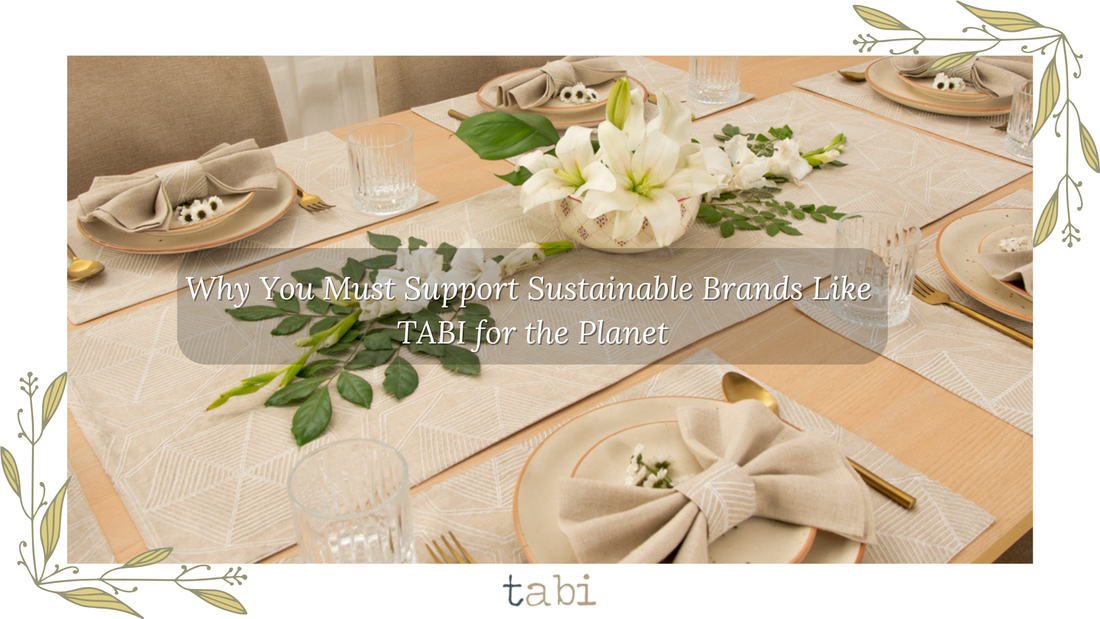
Why You Must Support Sustainable Brands Like TABI for the Planet
An era defined by environmental degradation, climate change, and increased ecological awareness has witnessed an unprecedented urge for sustainable practices in every walk of life. Supporting brands that care for sustainability, such as TABI, is not just a question of morals anymore; it's something more fundamental to creating a healthier Earth. This article explores the many reasons for championing sustainable brands and how companies such as TABI can be beacons to demonstrate the transformative potential of conscious consumerism.
Imperative for Sustainability
The world is faced with a rather unprecedented environmental crisis. From the melting ice caps and the continuously increasing sea levels to deforestation and pollution, the impact of human activity has left very heavy ramifications on the earth. According to United Nations reports, to control climate change, global carbon emissions need to be halved by 2030. In this context, sustainable brands are at the vanguard of this movement toward reducing ecological footprints and fostering responsible consumption.
Supporting sustainable brands like TABI is of top importance since they adopt practices that are associated with safeguarding the environment. Most of them usually opt for resources that are renewable, and most materials they use are sustainable and processed through ethical ways of manufacturing. Through such activities, consumers become an integral part of the impetus encouraging sustainable practice in industries.
Economic Impact of Sustainable Choices
The economic implications of patronizing sustainable brands are broader than just the personal choice. When consumers opt for brands like TABI, they are effectively investing in a larger economic model wherein sustainability outruns immediate profit-making ends. This is the kind of transformation needed to move toward an economy that fully values ecological integrity and social equity.
Sustainable brands are generally local job creators, fair wage advocates, and investors in their local economies. Consider the support for local sourcing and manufacturing through TABI, which, besides avoiding greenhouse gas emissions related to transportation, helps stimulate local economic activity. Consumers who make a choice to support such brands contribute toward building a circular economy valued by people and the planet, making them enhance resilience when faced with the challenges of global economies.
Ethical Consumption and Social Responsibility
Therefore, buying sustainable brands is an act of ethical consumption. Consumers today are increasingly becoming more aware of the impact their choices of purchases will have on society. By choosing brands that focus on social responsibility, such as TABI, a consumer becomes part of a movement advocating for transparency and accountability by business entities.
This automatically makes them sustainably conscious by not taking away from the working force and natural resources while producing their products; hence, there is fair trade. In recent years, accountability down the line has been a call of action for some customers who demand change and social responsibility on the part of these companies. Consumer advocacy for brands such as TABI empowers sustainable practices while also spearheading a culture of corporate responsibility that jolts companies into responsibility towards society at large.
Environmental Stewardship and Innovation
Upcycling is one of the most powerful transformative practices in sustainable fashion-revamping what brands do with waste and resources. TABI represents this trend: in material reuse, potential waste turns into one-of-a-kind, high-quality finished goods. This aids in reducing harm to the environment and supports circular economies complete with creativity and sustainability.
Supporting brands that are committed to sustainability and creating an ecosystem of innovation will be encouraged. When consumers exhibit a preference for products that are more environmentally friendly, it pressures the competitive market to gain or increase their market share through this means. Thus, ripples are created that impact industries as a whole, but most importantly, it motivates a new breed of entrepreneurs to consider themselves in the business of sustainability.
The Power of Consumer Choice
Consumer decisions are a powerful driver of transformation. When consumers make conscious decisions to favor sustainable brands like TABI, this market message is clear: sustainability counts. Such demand incites companies to become greener because their interest is deflected towards consumer expectations being fulfilled. The shift that consumers now accept might just wake the hardest 'industries as immovable' to take a re-evaluation of their current ways and move into sustainability.
Finally, consumer choice can be the impetus for challenging the status quo. Sustainable brands consumers are systematically weakening the market for fast fashion and disposable products: contributors to environmental degradation. Consumers with relevant knowledge wield a power whose might, if combined, could move markets and drive an economy toward greater sustainability.
Building a Sustainable Future Together
It is a community effort rather than being individualistic in support for sustainable brands. Brands like TABI can actually help consumers be tied into a sense of community regarding something they want to support in terms of sustainability. It is the community that lets this message of sustainability get amplified but empowers it with a culture of shared knowledge and resources for people to make appropriate choices.
TABI involves the customer in the cause through engagement with a dialogue, learning and education on sustainability. The consumer becomes an advocate of change empowered to further influence others by virtue of his or her knowledge. Together they can steer the sustainability agenda into the core of the consumption narrative.
Conclusion
Supporting sustainable brands like TABI is a commitment to the future of our planet. Navigating through the complexities that factor into environmental challenges is only proper if the individual and the community set out to support brands with sustainability at the forefront of their vision. Through informed consumerism, we will be promoting ethics, innovation, and contribute to a global movement seeking to preserve a better future for our planet.
However, because our choices sometimes become a nuisance in another's wallet, being an advocate for sustainable brands is actually an opportunity to line up what we value with what we do. In this world of connectivity, where our actions have far-reaching results that go beyond the checkout counter, business success should be defined not only by bottom-line profit but by bottom-line positive impacts on the environment and society. For such a future to grow, embracing this ethos is necessary, as does giving meaning to the future in something as beautiful as TABI.
FAQs on Supporting Sustainable Brands like TABI
1. What makes TABI a sustainable brand?
TABI promotes eco-friendly activities by considering renewable materials and ethical processes for production in order to ensure local sourcing. It reduces their carbon footprint while promoting social responsibility with the employees.
2. How would supporting sustainable brands impact the economy?
As such, therefore, the consumption of brands such as TABI would be regarded as investing in the local economies, fair wages, and even job creation. It is rational to advocate for the kind of circular economy where ecological integrity and social equity are valued to advocate for sustainable economic growth.
3. What is ethical consumption and how does TABI embody it?
Ethical consumption depends upon the social impact of products and influences the environment. TABI demonstrates responsible and good fair trade, transparency, and accountability in its supply chain, among other things.
4. In what ways is TABI supporting environmental stewardship?
TABI engages in upcycling by transforming waste materials into quality items. This reduces pollution, conserves resources, and inspires creativity for a greener future.
5. What can consumers do to promote the sustainability movement?
Spending steadily on green brands like TABI sends a sign that sustainability is the future, and such demands are going to force other companies to introduce green practices into their systems, thus creating ripples towards changing the way things are done in their respective fields.
